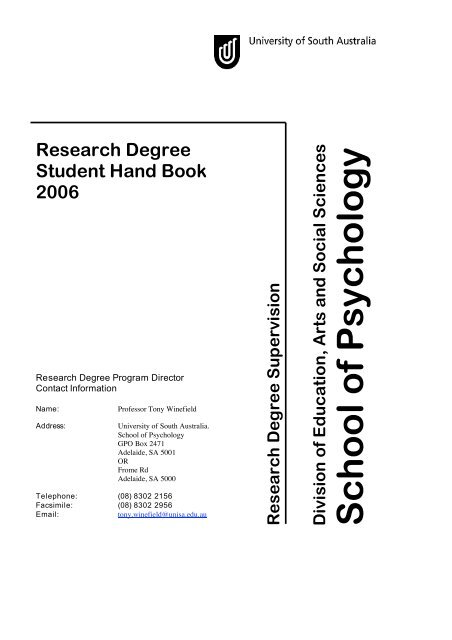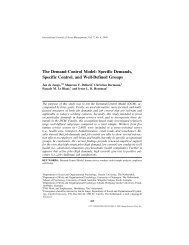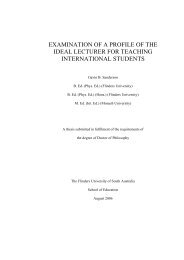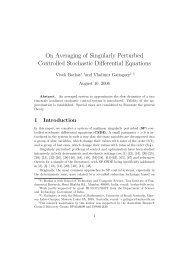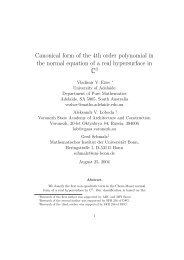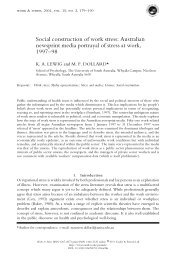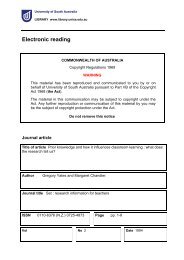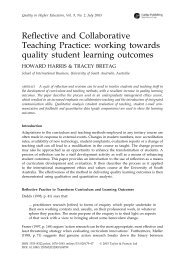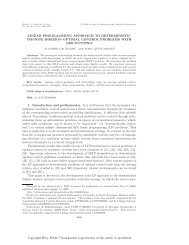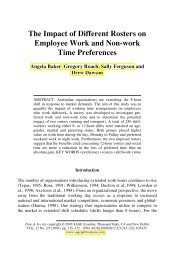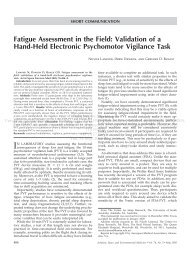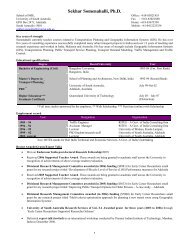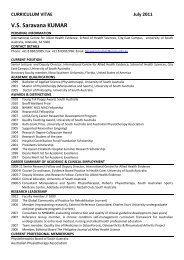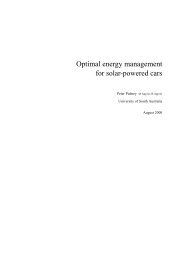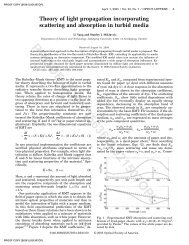S c h o o l o f P syc h o lo gy - Study at UniSA - University of South ...
S c h o o l o f P syc h o lo gy - Study at UniSA - University of South ...
S c h o o l o f P syc h o lo gy - Study at UniSA - University of South ...
Create successful ePaper yourself
Turn your PDF publications into a flip-book with our unique Google optimized e-Paper software.
Research Degree<br />
Student Hand Book<br />
2006<br />
Research Degree Program Director<br />
Contact Inform<strong>at</strong>ion<br />
Name:<br />
Address:<br />
Pr<strong>of</strong>essor Tony Winefield<br />
<strong>University</strong> <strong>of</strong> <strong>South</strong> Australia.<br />
School <strong>of</strong> P<strong>syc</strong>ho<strong>lo</strong><strong>gy</strong><br />
GPO Box 2471<br />
Adelaide, SA 5001<br />
OR<br />
Frome Rd<br />
Adelaide, SA 5000<br />
Telephone: (08) 8302 2156<br />
Facsimile: (08) 8302 2956<br />
Email:<br />
tony.winefield@unisa.edu.au<br />
Research Degree Supervision<br />
Division <strong>of</strong> Educ<strong>at</strong>ion, Arts and Social Sciences<br />
School <strong>of</strong> P<strong>syc</strong>ho<strong>lo</strong><strong>gy</strong>
This School Guide should be read in conjunction with the Division <strong>of</strong> Educ<strong>at</strong>ion, Arts and Social Sciences<br />
Inform<strong>at</strong>ion Guide for Postgradu<strong>at</strong>e Research Candid<strong>at</strong>es 2006 which is available in pdf form<strong>at</strong> on the<br />
Division Webpage where you will also find further useful inform<strong>at</strong>ion, some <strong>of</strong> which is included here.<br />
2<br />
GENERAL INFORMATION<br />
Welcome from the Head <strong>of</strong> School<br />
Welcome to the School <strong>of</strong> P<strong>syc</strong>ho<strong>lo</strong><strong>gy</strong>’s Research Degree Handbook. In here you will find<br />
everything you need to know about starting and completing PhDs or those Masters Programs th<strong>at</strong><br />
include a large measure <strong>of</strong> research. PhDs usually consist <strong>of</strong> research only, and you will work<br />
c<strong>lo</strong>sely with a research team or supervisor to guide you through.<br />
The School <strong>of</strong> P<strong>syc</strong>ho<strong>lo</strong><strong>gy</strong> is keen to encourage more research students as there are now significant<br />
emp<strong>lo</strong>yment opportunities for P<strong>syc</strong>ho<strong>lo</strong><strong>gy</strong> gradu<strong>at</strong>es to work in research. This can be within<br />
government, priv<strong>at</strong>e research companies, CSIRO, or the universities. Many <strong>of</strong> our postgradu<strong>at</strong>es go<br />
overseas l<strong>at</strong>er to research or work. All Government endeavours are requiring an evidence base for<br />
making policy decisions and so the number <strong>of</strong> research jobs in increasing. It is an exciting time to<br />
be starting a research career.<br />
Research degrees are run through the Division and the <strong>University</strong> r<strong>at</strong>her than just the School <strong>of</strong><br />
P<strong>syc</strong>ho<strong>lo</strong><strong>gy</strong> (as are undergradu<strong>at</strong>e degrees), so this School Guide should be read in conjunction<br />
with the Division <strong>of</strong> Educ<strong>at</strong>ion, Arts and Social Sciences Inform<strong>at</strong>ion Guide for Postgradu<strong>at</strong>e<br />
Research Candid<strong>at</strong>es 2006. This Guide is available in PDF form<strong>at</strong> on the Division Webpage where<br />
you will also find further useful inform<strong>at</strong>ion, some <strong>of</strong> which is included here.<br />
Details <strong>of</strong> specific P<strong>syc</strong>ho<strong>lo</strong><strong>gy</strong> staff who can supervise your PhD or Masters research will be found<br />
towards the end <strong>of</strong> this Handbook. Pr<strong>of</strong>essor Tony Winefield is the School <strong>of</strong> P<strong>syc</strong>ho<strong>lo</strong><strong>gy</strong> Research<br />
Degree Coordin<strong>at</strong>or, and there is more about him on p. 4. He can probably answer most <strong>of</strong> your<br />
questions or help you find a suitable supervisor for your interests.<br />
You will be trained as a well-rounded researcher with a program th<strong>at</strong> includes how to write-up<br />
research, present <strong>at</strong> conferences and seminars, and work either a<strong>lo</strong>ne or as part <strong>of</strong> a dynamic<br />
research team. The School <strong>of</strong> P<strong>syc</strong>ho<strong>lo</strong><strong>gy</strong> <strong>lo</strong>oks forward to having you on board and being part <strong>of</strong><br />
our overall research activities.<br />
Pr<strong>of</strong>essor Bernard Guerin<br />
Head <strong>of</strong> the School <strong>of</strong> P<strong>syc</strong>ho<strong>lo</strong><strong>gy</strong><br />
Welcome from Dean <strong>of</strong> Research Degrees<br />
Research Degree Student Handbook 2006
3<br />
Welcome to the 2006 Postgradu<strong>at</strong>e Research Student Handbook for the Division <strong>of</strong> Educ<strong>at</strong>ion, Arts and<br />
Social Sciences. You’ll find details <strong>of</strong> our Research Educ<strong>at</strong>ion Program and other useful links and<br />
inform<strong>at</strong>ion for new and continuing students.<br />
As a research student you will have enrolled in one <strong>of</strong> several types <strong>of</strong> research degree: a Doctor <strong>of</strong><br />
Phi<strong>lo</strong>sophy program; a Masters by Research program; or a Pr<strong>of</strong>essional Doctor<strong>at</strong>e program th<strong>at</strong> includes a<br />
significant proportion <strong>of</strong> research. The mode in which you study will be a combin<strong>at</strong>ion <strong>of</strong>: full time or part<br />
time; on-campus (internal) or <strong>of</strong>f-campus (distance) and as an Australian or an overseas student.<br />
The Government’s Research Training Scheme puts enormous pressure on Universities to ensure Research<br />
Degree students complete on time, so Research Educ<strong>at</strong>ion Programs have been deve<strong>lo</strong>ped to give you the<br />
skills to ‘hit the ground running’. For commencing students most Divisional sessions are in the first six<br />
months (or first year for part timers) <strong>of</strong> your candid<strong>at</strong>ure. You are expected to complete these, together with<br />
relevant sessions from the <strong>University</strong>-wide Research Educ<strong>at</strong>ion Program. In particular, don’t miss the vital<br />
Orient<strong>at</strong>ion session and its <strong>University</strong> equivalent. Th<strong>at</strong>’s how you’ll find the names <strong>of</strong> important contacts<br />
and the structure <strong>of</strong> systems. Continuing students will use this Handbook for inform<strong>at</strong>ion on the process <strong>of</strong><br />
thesis writing, and links to a growing list <strong>of</strong> <strong>UniSA</strong> workshops. In addition you will present on your research<br />
<strong>at</strong> least once a year and <strong>at</strong>tend the Division’s Postgradu<strong>at</strong>e Research Forum.<br />
Our Research Educ<strong>at</strong>ion Program can only be an introduction to research for beginning researchers. If it<br />
doesn’t suit your situ<strong>at</strong>ion contact your School’s Research Degree Coordin<strong>at</strong>or, your Supervisor or the<br />
program coordin<strong>at</strong>or. They will either provide their own program or guide you to other places. For example,<br />
Art students have seminars run by the School <strong>of</strong> Art. In the case <strong>of</strong> those doing one <strong>of</strong> the Pr<strong>of</strong>essional<br />
Doctor<strong>at</strong>es, a separ<strong>at</strong>e section in the Handbook gives details <strong>of</strong> your course and contact names. Pr<strong>of</strong>essional<br />
Doctor<strong>at</strong>e students, please note th<strong>at</strong> you will probably not need to <strong>at</strong>tend the Divisional sessions until your<br />
second year when you have completed your course work and begun your research activities. Wh<strong>at</strong>ever your<br />
requirements, feel free to <strong>at</strong>tend any <strong>of</strong> our sessions and access the huge range <strong>of</strong> online resources we have<br />
assembled.<br />
It is my job as Dean <strong>of</strong> Research Degrees to provide the organis<strong>at</strong>ion and infrastructure to help you<br />
undertake a research degree. While your Supervisors and School Research Degrees Coordin<strong>at</strong>or will provide<br />
you with day to day advice and support, I am also here for students if needed. Contact my friendly staff in<br />
the Divisional research <strong>of</strong>fice (H2-02, Magill Campus). Gail Mahon is the research project <strong>of</strong>ficer, and<br />
Samantha Millar <strong>lo</strong>oks after student records and systems.<br />
I wish you well as you begin or continue your important research.<br />
Associ<strong>at</strong>e Pr<strong>of</strong>essor Bruce Johnson<br />
Dean <strong>of</strong> Research Degrees<br />
Dean <strong>of</strong> Research Degrees (Divisional position)<br />
Associ<strong>at</strong>e Pr<strong>of</strong>essor Bruce Johnson was appointed Dean <strong>of</strong> Research Degrees in August<br />
2003. Prior to this, he was Research Degrees Coordin<strong>at</strong>or in the School <strong>of</strong> Educ<strong>at</strong>ion for 5 years. He is an<br />
active and productive researcher working as a Key Researcher in the Centre for Research in Educ<strong>at</strong>ion,<br />
Equity and Work. Bruce’s research and supervision expertise is in the areas <strong>of</strong> school change, teacher<br />
deve<strong>lo</strong>pment, and student welfare.<br />
Bruce is responsible for such specific aspects <strong>of</strong> research degrees co-ordin<strong>at</strong>ion as:<br />
• organising the Research Educ<strong>at</strong>ion Program for research degree students<br />
Research Degree Student Handbook 2006
• ensuring student access to the support services and facilities for research students provided by the<br />
<strong>University</strong> and Division<br />
• monitoring students’ progress throughout the period <strong>of</strong> their candid<strong>at</strong>ure<br />
• approving examiners and the outcomes <strong>of</strong> the examin<strong>at</strong>ion process<br />
• representing the Division on <strong>University</strong> Research Degrees and Scholarships Committees<br />
4<br />
School <strong>of</strong> P<strong>syc</strong>ho<strong>lo</strong><strong>gy</strong> Research Degrees Coordin<strong>at</strong>or<br />
Pr<strong>of</strong>essor Tony Winefield completed his BA (Honours) and Ph.D degrees <strong>at</strong> <strong>University</strong><br />
College London before coming to Australia. He joined the <strong>University</strong> <strong>of</strong> <strong>South</strong> Australia as Found<strong>at</strong>ion<br />
Pr<strong>of</strong>essor <strong>of</strong> P<strong>syc</strong>ho<strong>lo</strong><strong>gy</strong> in 1999 after a brief spell <strong>at</strong> the <strong>University</strong> <strong>of</strong> Adelaide where he remains an<br />
Honorary Visiting Research Fel<strong>lo</strong>w. Tony is Director <strong>of</strong> the Centre for Applied P<strong>syc</strong>ho<strong>lo</strong>gical Research, a<br />
Fel<strong>lo</strong>w <strong>of</strong> the Australian P<strong>syc</strong>ho<strong>lo</strong>gical Society, the academic member <strong>of</strong> the St<strong>at</strong>e P<strong>syc</strong>ho<strong>lo</strong>gical Board and<br />
Chair <strong>of</strong> its Registr<strong>at</strong>ion Committee. From 2000-2004 he was the <strong>University</strong>’s represent<strong>at</strong>ive on the Channel<br />
7 Children's Research Committee. In 1993 he received the ‘Supervisor <strong>of</strong> the Year’ award from the<br />
<strong>University</strong> <strong>of</strong> Adelaide Postgradu<strong>at</strong>e Students’ Associ<strong>at</strong>ion and in 2003 the Elton Mayo award from the<br />
Australian P<strong>syc</strong>ho<strong>lo</strong>gical Society’s College <strong>of</strong> Organis<strong>at</strong>ional P<strong>syc</strong>ho<strong>lo</strong>gists for ‘Outstanding contributions<br />
to Industrial/Organis<strong>at</strong>ional P<strong>syc</strong>ho<strong>lo</strong><strong>gy</strong> Research and Teaching.’ He has supervised 17 PhDs to completion,<br />
published more than 150 articles, books and chapters and given more than 100 conference present<strong>at</strong>ions,<br />
many by invit<strong>at</strong>ion. His research interests include the p<strong>syc</strong>ho<strong>lo</strong><strong>gy</strong> <strong>of</strong> unemp<strong>lo</strong>yment, organis<strong>at</strong>ional stress<br />
and animal learning. He is currently Associ<strong>at</strong>e Editor <strong>of</strong> the Intern<strong>at</strong>ional Journal <strong>of</strong> Stress Management.<br />
See ‘How not to complete a Ph.D’ and ‘The bad supervision guide’ on my homepage<br />
The Dean <strong>of</strong> Gradu<strong>at</strong>e Studies (<strong>University</strong> position)<br />
Pr<strong>of</strong>essor Edgar (Ed) Carson took up the position <strong>of</strong> Dean <strong>of</strong> Gradu<strong>at</strong>e Studies in July<br />
2003. He was previously Dean <strong>of</strong> Research in the Division <strong>of</strong> Educ<strong>at</strong>ion, Arts and Social Sciences. His<br />
research expertise is in the area <strong>of</strong> emp<strong>lo</strong>yment and labour market programs in Australia. He has particular<br />
research interests in the area <strong>of</strong> disadvantaged job seekers, including m<strong>at</strong>ure age workers, young job seekers,<br />
and <strong>lo</strong>ng term unemp<strong>lo</strong>yed. He has also undertaken research on more general aspects <strong>of</strong> social disadvantage<br />
and social policy, including housing issues<br />
Divisional research <strong>of</strong>fice<br />
You’ll find the research <strong>of</strong>fice <strong>at</strong> Magill Campus in the Amy Whe<strong>at</strong>on Building. (It’s the modern building on<br />
the northern side <strong>of</strong> the creek, next to Murray House pictured above.) Just go upstairs and through the glass<br />
doors to Room H2-20. Julie White is there to take your leave and claim forms and to help with any queries.<br />
Julie is part <strong>of</strong> your research community and an important part <strong>of</strong> your networking. Call in any time for<br />
inform<strong>at</strong>ion or just to say hel<strong>lo</strong>. And a warning - when you come to hand in your thesis she’ll snap your<br />
photo and add it to the students’ ‘wall <strong>of</strong> fame’ in the <strong>of</strong>fice.<br />
Julie White<br />
Research Degree Student Handbook 2006
5<br />
Divisional Research Degrees Committee<br />
The Divisional Research Degrees Committee ensures the effective management <strong>of</strong> procedures and<br />
guidelines rel<strong>at</strong>ing to research degrees <strong>of</strong>fered by the Division in accordance with <strong>University</strong> policies.<br />
For example, the Committee:<br />
• monitors the submission and standard <strong>of</strong> research proposals, ethics protocols and annual progress<br />
reports in rel<strong>at</strong>ion to <strong>University</strong> and Division requirements, and identifies areas <strong>of</strong> improvement OR<br />
need<br />
• establishes processes for approval <strong>of</strong> research proposals<br />
• manages the Divisional Research Degrees Management Plan and facilit<strong>at</strong>es processes for its upd<strong>at</strong>ing<br />
and improvement<br />
• monitors promotion and public<strong>at</strong>ion <strong>of</strong> research degree programs<br />
• monitors program and course review for research degree programs<br />
Note: There is a research student represent<strong>at</strong>ive on this committee. For contact details please call Julie White<br />
on 8302 4372 or email Julie.White@unisa.edu.au<br />
Research Degrees Coordin<strong>at</strong>ors<br />
Research Degrees Coordin<strong>at</strong>ors are in each School or, in the case <strong>of</strong> Educ<strong>at</strong>ion, in sections <strong>of</strong> the School.<br />
They are the primary points <strong>of</strong> everyday contact for research degrees students. For example:<br />
• they address issues rel<strong>at</strong>ed to supervision<br />
• they set up the panels to review research proposals<br />
• they carry out the student interviews <strong>at</strong> the time <strong>of</strong> the Review <strong>of</strong> Progress<br />
• in conjunction with Supervisors they recommend thesis examiners<br />
Research degrees support fund<br />
The St<strong>at</strong>ement <strong>of</strong> Resources for Higher Degree by Research students is currently being upd<strong>at</strong>ed and<br />
will be released in time for the 2006 uni-wide research degrees orient<strong>at</strong>ion in Feb 06.<br />
The Division makes some funding available to research degree students for expenses rel<strong>at</strong>ed to their<br />
research. Claims should be sent to Julie in the Divisional research <strong>of</strong>fice.<br />
Currently, each semester, full time students can claim up to $200 and part time students $100 for research<br />
rel<strong>at</strong>ed expenses. Al<strong>lo</strong>wable expenses will vary dependent upon your area <strong>of</strong> study, however, in general they<br />
include photocopying, printing, st<strong>at</strong>ionary and m<strong>at</strong>erials required for exhibitions. All claims must include<br />
valid receipts. Funding does not carry over years.<br />
Travel fund<br />
Up to $1200 reimbursement for expenses rel<strong>at</strong>ed to <strong>at</strong>tendance and present<strong>at</strong>ion <strong>of</strong> a paper <strong>at</strong> a n<strong>at</strong>ional or<br />
intern<strong>at</strong>ional conference is available during your candid<strong>at</strong>ure. Claims should be sent to Sam in the Divisional<br />
research <strong>of</strong>fice. While you can access this funding in whole or in part <strong>at</strong> any time throughout your term <strong>of</strong><br />
candid<strong>at</strong>ure a maximum <strong>of</strong> $600 per claim is al<strong>lo</strong>wed for conferences <strong>at</strong>tended within Australia. The full<br />
$1200 can be claimed for <strong>at</strong>tendance <strong>at</strong> an Intern<strong>at</strong>ional conference. All claims must include pro<strong>of</strong> <strong>of</strong><br />
registr<strong>at</strong>ion and present<strong>at</strong>ion <strong>at</strong> the conference (e.g. receipts and/or programs) and receipts rel<strong>at</strong>ed to<br />
expenses being claimed such as airfares and accommod<strong>at</strong>ion.<br />
Sick leave<br />
Candid<strong>at</strong>es are entitled to up to ten days sick leave in any one year <strong>of</strong> candid<strong>at</strong>ure and this may be accrued<br />
over the tenure <strong>of</strong> the award. Scholarship holders may also receive additional paid sick leave <strong>of</strong> up to a total<br />
<strong>of</strong> twelve weeks during their award for medically substanti<strong>at</strong>ed periods <strong>of</strong> illness lasting <strong>lo</strong>nger than ten<br />
days. If this occurs, the tenure <strong>of</strong> the scholarship will be extended by th<strong>at</strong> period.<br />
Sick leave entitlements may also be extended to cover holders with family responsibilities caring for sick<br />
children or rel<strong>at</strong>ives, subject to the usual <strong>UniSA</strong> requirements. For further inform<strong>at</strong>ion see:<br />
http://www.unisa.edu.au/research/degrees/resources_currentstud/default.asp<br />
M<strong>at</strong>ernity leave<br />
Once Australian Postgradu<strong>at</strong>e Award and <strong>University</strong> <strong>of</strong> <strong>South</strong> Australia Postgradu<strong>at</strong>e Research Award<br />
holders have completed twelve months <strong>of</strong> their award, they are entitled to a maximum <strong>of</strong> twelve weeks paid<br />
m<strong>at</strong>ernity leave during the tenure <strong>of</strong> the award. Periods <strong>of</strong> paid m<strong>at</strong>ernity leave are in addition to the normal<br />
dur<strong>at</strong>ion <strong>of</strong> the APA/USAPRA. APA/USAPRA holders who have not completed twelve months <strong>of</strong> their<br />
Research Degree Student Handbook 2006
award may access unpaid m<strong>at</strong>ernity leave. Non scholarship candid<strong>at</strong>es’ m<strong>at</strong>ernity leave is included in their<br />
general leave entitlements.<br />
Recre<strong>at</strong>ion leave<br />
Candid<strong>at</strong>es are entitled to up to twenty days recre<strong>at</strong>ion leave in any year <strong>of</strong> candid<strong>at</strong>ure and this may be<br />
accrued.<br />
Leave <strong>of</strong> absence<br />
Leave may be taken for a maximum <strong>of</strong> six months <strong>at</strong> any one time.<br />
The total period <strong>of</strong> the leave <strong>of</strong> absence accumul<strong>at</strong>ed in a given candid<strong>at</strong>ure will not normally exceed<br />
twelve months. If the <strong>University</strong> Research Degrees Committee deems the circumstances to be exceptional, a<br />
maximum total amount <strong>of</strong> leave <strong>of</strong> twenty four months may be granted. No further leave will be available<br />
after a total <strong>of</strong> twenty four months leave has been granted. This applies to both full-time and part-time<br />
candid<strong>at</strong>es. A request for leave <strong>of</strong> absence should be made on the<br />
appropri<strong>at</strong>e form, which can be found <strong>at</strong>: http://www.unisa.edu.au/orc/resdeg/docs/leave.rtf<br />
Emp<strong>lo</strong>yment<br />
The primary role <strong>of</strong> full-time research degree students is to work on their research and complete their thesis<br />
within the al<strong>lo</strong>c<strong>at</strong>ed period <strong>of</strong> candid<strong>at</strong>ure.<br />
The <strong>University</strong>’s Research Degrees Committee recommends th<strong>at</strong> full-time candid<strong>at</strong>es undertake paid<br />
emp<strong>lo</strong>yment for no more than eight hours per week or for a total <strong>of</strong> the equivalent <strong>of</strong> eight hours per week<br />
over a twelve month period.<br />
DIVISIONAL RESEARCH EDUCATION PROGRAM (REP)<br />
6<br />
Dr Wendy Bastalich holds the position <strong>of</strong> Learning Adviser – Research Educ<strong>at</strong>ion<br />
within the Flexible Learning Centre. She is <strong>lo</strong>c<strong>at</strong>ed on Level 2 <strong>of</strong> the Playford Building <strong>at</strong> City East (next to<br />
the main CAPR area. She is responsible for the program which is is provided by the Division <strong>of</strong> Educ<strong>at</strong>ion,<br />
Arts and Social Sciences for its PhD, Pr<strong>of</strong>essional Doctor<strong>at</strong>es and Masters by Research candid<strong>at</strong>es.<br />
Inform<strong>at</strong>ion in the fol<strong>lo</strong>wing section rel<strong>at</strong>es to the Divisional program. The timetable will be finalised in<br />
February and distributed via email to all candid<strong>at</strong>es. The REP’s aim is to assist candid<strong>at</strong>es in deve<strong>lo</strong>ping and<br />
refining their thesis proposal. In addition, it introduces candid<strong>at</strong>es to the major support services which are<br />
provided by the Division. The program also provides a forum in which candid<strong>at</strong>es can discuss their progress<br />
and concerns and review each other’s work.<br />
Program for Commencing Research Degree Candid<strong>at</strong>es<br />
Candid<strong>at</strong>es are required to <strong>at</strong>tend sessions in the first year <strong>of</strong> their candidacy, usually over a six-month<br />
period with meetings held fortnightly. The dur<strong>at</strong>ion <strong>of</strong> sessions varies, but typically last for three hours and<br />
are held in the evening. External candid<strong>at</strong>es will be contacted by the Divisional research <strong>of</strong>fice or a<br />
facilit<strong>at</strong>or to arrange suitable times for teleconferences which cover the same topics, but in a less formal<br />
way. Teleconference charges are borne by the Division, not the individual candid<strong>at</strong>e. The REP is designed to<br />
prepare you to write your research proposal, deve<strong>lo</strong>p your methodo<strong>lo</strong><strong>gy</strong> and work towards presenting a<br />
paper <strong>at</strong> the Annual Postgradu<strong>at</strong>e Research Forum. There will be opportunities to ask questions about the<br />
research degree process, meet other research degree candid<strong>at</strong>es and learn some str<strong>at</strong>egies for surviving (and<br />
enjoying) the process.<br />
Program for Continuing Research Degree Candid<strong>at</strong>es<br />
Research Degree Student Handbook 2006
This program is for candid<strong>at</strong>es whose thesis proposals have been approved and are under way with their<br />
research. An exciting series <strong>of</strong> workshops has been planned. These will enable candid<strong>at</strong>es to particip<strong>at</strong>e in<br />
methodo<strong>lo</strong>gical discussions, ethical m<strong>at</strong>ters and learn about research tools such as SPSS and NuDIST.<br />
Program for Completing Research Degree Candid<strong>at</strong>es<br />
The completing program is designed to assist candid<strong>at</strong>es who are in the final stages <strong>of</strong> writing their theses.<br />
This series <strong>of</strong> workshops will address topics such as thesis present<strong>at</strong>ion, the examin<strong>at</strong>ion experience and life<br />
after completion.<br />
Requirement to present a paper<br />
All continuing research candid<strong>at</strong>es are required to present on their research. This requirement should be met<br />
by one or more <strong>of</strong> the fol<strong>lo</strong>wing:<br />
1. Conference present<strong>at</strong>ion<br />
You may choose to deliver a paper <strong>at</strong> an academic conference. If you would like assistance in planning<br />
and present<strong>at</strong>ion you can ask your Supervisor and compliment their assistance by coming a<strong>lo</strong>ng to the<br />
Research Educ<strong>at</strong>ion Program.<br />
2. Forum<br />
Each year a Divisional Research Forum is held within the university. This is a full-scale conference and<br />
is deve<strong>lo</strong>ping into a significant event in the academic research calendar, with lively academic deb<strong>at</strong>e<br />
from visiting speakers, staff and candid<strong>at</strong>es. In 2005 it will extend over two days – the evening <strong>of</strong> Friday<br />
August 6 th and S<strong>at</strong>urday August 7th. If you have not presented a research paper <strong>at</strong> another venue or<br />
teleconference you should do so <strong>at</strong> the Forum, although it is highly recommended th<strong>at</strong> you present here<br />
even if you have presented elsewhere. Talk to your Supervisor about it. You are required to submit<br />
abstracts prior to the Forum. All research candid<strong>at</strong>es and staff in the Division receive an invit<strong>at</strong>ion to<br />
<strong>at</strong>tend the Forum.<br />
3. Topical seminars<br />
Other seminars by staff members or visiting scholars will be publicised on the Divisional Research<br />
Degrees website. Attendance <strong>at</strong> these present<strong>at</strong>ions is optional but strongly encouraged.<br />
CONTACTS<br />
Division <strong>of</strong> EASS Librarians<br />
City East and Magill<br />
Academic Library services: Ann Luzeckyi 8302 4630<br />
LBY-EASS-DivLibrarians@unisa.edu.au<br />
Divisional research <strong>of</strong>fice:<br />
Project Officer: Julie White 8302 4372 Julie.White@unisa.edu.au<br />
School <strong>of</strong> P<strong>syc</strong>ho<strong>lo</strong><strong>gy</strong> Research Degree Coordin<strong>at</strong>or:<br />
Pr<strong>of</strong>essor Tony Winefield 8302 2156 Tony.Winefield@unisa.edu.au<br />
Research services:<br />
Andrew Beveridge 8302 5069 Andrew.Beveridge@unisa.edu.au<br />
Flexible Learning Centre Advisor - Research Educ<strong>at</strong>ion:<br />
Wendy Bastalich 8302 2760 Wendy.Bastalich@unisa.edu.au<br />
<strong>University</strong> wide Research Educ<strong>at</strong>ion Program:<br />
Tori Hocking 8302 0158 Tori.Hocking@unisa.edu.au<br />
Dean <strong>of</strong> Research Degrees:<br />
Associ<strong>at</strong>e Pr<strong>of</strong>essor Bruce Johnson 8302 4059 Bruce.Johnson@unisa.edu.au<br />
7<br />
DOING A PHD IN PSYCHOLOGY<br />
Minimum requirement<br />
In order to enrol for a research degree in the School <strong>of</strong> P<strong>syc</strong>ho<strong>lo</strong><strong>gy</strong> (MSS or PhD) you need a good Honours<br />
degree in P<strong>syc</strong>ho<strong>lo</strong><strong>gy</strong>, or the equivalent. You may enrol either as an internal or as an external candid<strong>at</strong>e. You<br />
may also enrol as a full time or a part time candid<strong>at</strong>e. If you enrol as a full time candid<strong>at</strong>e you are expected<br />
to complete the MSS within 2 years and the PhD degree within 3 years. (If you enrol part-time, the<br />
corresponding expect<strong>at</strong>ions are 4 years and 6 years).<br />
Supervision<br />
Research Degree Student Handbook 2006
All PhD Students are required to have a Principal Supervisor and an Associ<strong>at</strong>e Supervisor. Only those<br />
members <strong>of</strong> the School who are listed on the <strong>University</strong> Research Register are available as Principal<br />
Supervisors. They normally hold PhD degrees and have experience <strong>of</strong> successful research degree<br />
supervision. Before you can be accepted by the School, you must find a Principal Supervisor who is willing<br />
to act. You are encouraged to make contact with one or more <strong>of</strong> the people listed be<strong>lo</strong>w in order to discuss<br />
your research topic. Their research interests are listed and further inform<strong>at</strong>ion about their public<strong>at</strong>ions can be<br />
obtained through relevant d<strong>at</strong>abases (such P<strong>syc</strong>INFO) via the Library.<br />
RESOURCES FOR PHD CANDIDATES FOR 2005<br />
St<strong>at</strong>ement <strong>of</strong> Resources for Research Degree Candid<strong>at</strong>es studying in Australia<br />
Endorsed by Senior Management Group on 15th October 2003<br />
Approved by Academic Board on 28 November 2003<br />
Preamble<br />
The <strong>University</strong> <strong>of</strong> <strong>South</strong> Australia has postgradu<strong>at</strong>e research degree candid<strong>at</strong>es studying full-time or<br />
part-time, on-campus or externally in a range <strong>of</strong> <strong>lo</strong>c<strong>at</strong>ions around Australia.<br />
Postgradu<strong>at</strong>e research degree candid<strong>at</strong>es (research candid<strong>at</strong>es) <strong>at</strong> <strong>UniSA</strong> are expected to produce<br />
work <strong>of</strong> a very high standard and require facilities <strong>of</strong> an equivalent standard with which to do this.<br />
All research candid<strong>at</strong>es should be able to work in areas th<strong>at</strong> are free <strong>of</strong> discrimin<strong>at</strong>ion on the basis<br />
<strong>of</strong> age, gender, race, disability and sexuality; and which are free <strong>of</strong> sexual harassment.<br />
Project specific resources<br />
The <strong>University</strong> recognises th<strong>at</strong> in order to complete their program <strong>of</strong> research, research candid<strong>at</strong>es<br />
may require specific equipment, labor<strong>at</strong>ory or studio space and funds adequ<strong>at</strong>e for the prosecution<br />
<strong>of</strong> the research program and the cost <strong>of</strong> consumables. These expenses may include travel expenses<br />
arising from field work, experiments and d<strong>at</strong>a collection. These costs are to be considered by the<br />
Supervisor and the Head <strong>of</strong> School prior to the commencement <strong>of</strong> study for the degree and<br />
negoti<strong>at</strong>ed with the research student during the prepar<strong>at</strong>ion and acceptance <strong>of</strong> the research<br />
proposal.<br />
The Head <strong>of</strong> School and Divisional Dean/Chair <strong>of</strong> Research Management Committee sign the<br />
recommend<strong>at</strong>ion form to accept research candid<strong>at</strong>es and in doing so are committing the area to<br />
funding the proposed research program. Divisions/Institutes/Whyalla receive funding from the<br />
<strong>University</strong>’s budget from funds received from the Department <strong>of</strong> Educ<strong>at</strong>ion, Science and Training’s<br />
Research Training Scheme (RTS) and revenue from intern<strong>at</strong>ional student fees.<br />
Should a change <strong>of</strong> proposal prove necessary, resources may be renegoti<strong>at</strong>ed between the research<br />
candid<strong>at</strong>e, the Supervisor and the Head <strong>of</strong> School.<br />
The Head <strong>of</strong> School must aim to ensure the provision <strong>of</strong> the resources and assistance necessary for<br />
the research candid<strong>at</strong>e to complete the research project within the period <strong>of</strong> candid<strong>at</strong>ure.<br />
In addition to project specific resources, the <strong>University</strong> will aim to provide the fol<strong>lo</strong>wing basic<br />
facilities th<strong>at</strong> research students can expect while completing a <strong>University</strong> <strong>of</strong> <strong>South</strong> Australia higher<br />
degree. Research Degree Coordin<strong>at</strong>ors can provide further explan<strong>at</strong>ion <strong>of</strong> the st<strong>at</strong>ement.<br />
Definitions<br />
'Access' means use <strong>of</strong> when needed for a candid<strong>at</strong>e's research project work purposes. 'Dedic<strong>at</strong>ed'<br />
wherever possible means sole access. However in some circumstances this will mean shared<br />
facilities, preferably by not more than two research candid<strong>at</strong>es.<br />
<strong>Study</strong> facilities: on-campus<br />
The <strong>University</strong> shall aim to provide on-campus research candid<strong>at</strong>es with the fol<strong>lo</strong>wing facilities<br />
available 24 hours a day subject to safety requirements. Part time research candid<strong>at</strong>es shall have pro<br />
r<strong>at</strong>a access to the same facilities as full-time students. Access to these facilities will be negoti<strong>at</strong>ed<br />
with each candid<strong>at</strong>e, taking into account their needs and preferred mode <strong>of</strong> study:<br />
1. a dedic<strong>at</strong>ed ergonomic chair and desk<br />
2. dedic<strong>at</strong>ed secure storage for research m<strong>at</strong>erials <strong>of</strong> <strong>at</strong> least 2 <strong>lo</strong>ckable filing cabinet drawers<br />
Research Degree Student Handbook 2006<br />
8
3. a dedic<strong>at</strong>ed personal computer, Micros<strong>of</strong>t Office s<strong>of</strong>tware, email and internet access<br />
4.work space th<strong>at</strong> is secure and is in accordance with the <strong>University</strong>’s occup<strong>at</strong>ional health, safety<br />
and welfare standards<br />
5. a telephone for incoming and internal calls and outgoing <strong>lo</strong>cal calls for research purposes<br />
6. a photocopier and computer printing facilities<br />
7. inform<strong>at</strong>ion techno<strong>lo</strong><strong>gy</strong> support and departmental technical support<br />
8. library facilities including Australian and overseas interlibrary <strong>lo</strong>ans, electronic journals where<br />
possible and prompt access to liaison librarians and other staff. Schools should al<strong>lo</strong>c<strong>at</strong>e sufficient<br />
funds to meet the cost for <strong>at</strong> least ten n<strong>at</strong>ional and four intern<strong>at</strong>ional/fast track/video library <strong>lo</strong>ans<br />
per year <strong>of</strong> candid<strong>at</strong>ure for each full-time postgradu<strong>at</strong>e research candid<strong>at</strong>e (2002 fees are $8 for an<br />
interlibrary <strong>lo</strong>an in Australia and $18 for overseas/fast track/video). For part-time research<br />
candid<strong>at</strong>es, the al<strong>lo</strong>c<strong>at</strong>ion will be on a pro-r<strong>at</strong>a basis<br />
9. a Maintenance Al<strong>lo</strong>wance <strong>of</strong> <strong>at</strong> least $300 per annum for full-time research students ($150 per<br />
annum for part-time research students) to cover expenses associ<strong>at</strong>ed with inter-library <strong>lo</strong>ans in<br />
excess <strong>of</strong> the above al<strong>lo</strong>wance, access to specialist online d<strong>at</strong>abases (eg p<strong>at</strong>ents), photocopying and<br />
printing costs, postage, fax, phone calls, st<strong>at</strong>ionery, binding and other services required to produce<br />
draft copies <strong>of</strong> the thesis<br />
10. where research candid<strong>at</strong>es do not hold scholarships, an al<strong>lo</strong>wance <strong>of</strong> $200 should be made<br />
available for the production and binding <strong>of</strong> the final copy <strong>of</strong> the thesis<br />
The al<strong>lo</strong>wances can be claimed on the appropri<strong>at</strong>e form and receipts/explan<strong>at</strong>ion provided.<br />
Unexpended maintenance al<strong>lo</strong>wance may be carried forward to future years<br />
11. <strong>at</strong> least $800 should be available to each research candid<strong>at</strong>e for the purpose <strong>of</strong> delivering<br />
conference paper/s, preferably refereed, <strong>at</strong> conferences over the course <strong>of</strong> their candid<strong>at</strong>ure.<br />
Consult<strong>at</strong>ion with the supervisor is required to determine the choice <strong>of</strong> conference.<br />
<strong>Study</strong> facilities: <strong>of</strong>f-campus<br />
Where research candid<strong>at</strong>es study <strong>of</strong>f-campus in Australia, such th<strong>at</strong> they relinquish access to study<br />
facilities as described above, the <strong>University</strong> shall aim to provide them with:<br />
1. Dial-up computer facilities, wherever possible, in their <strong>of</strong>f-campus study <strong>lo</strong>c<strong>at</strong>ion and<br />
inform<strong>at</strong>ion techno<strong>lo</strong><strong>gy</strong> support and departmental technical support for Dial-up<br />
2. library facilities including Australian and overseas interlibrary <strong>lo</strong>ans, electronic journals where<br />
possible and prompt communic<strong>at</strong>ion with liaison librarians and other staff. Schools should al<strong>lo</strong>c<strong>at</strong>e<br />
sufficient funds to meet the cost for <strong>at</strong> least ten n<strong>at</strong>ional and four intern<strong>at</strong>ional/fast track/video<br />
library <strong>lo</strong>ans per year <strong>of</strong> candid<strong>at</strong>ure for each full-time postgradu<strong>at</strong>e research candid<strong>at</strong>e (2002 fees<br />
are $8 for an interlibrary <strong>lo</strong>an in Australia and $18 for overseas/fast track/video). For part-time<br />
research candid<strong>at</strong>es, the al<strong>lo</strong>c<strong>at</strong>ion will be on a pro-r<strong>at</strong>a basis<br />
3. a Maintenance Al<strong>lo</strong>wance <strong>of</strong> <strong>at</strong> least $500 per annum for full-time research students ($250 per<br />
annum for part-time research candid<strong>at</strong>es) to cover expenses associ<strong>at</strong>ed with inter-library <strong>lo</strong>ans in<br />
excess <strong>of</strong> the above al<strong>lo</strong>wance, access to specialist online d<strong>at</strong>abases (eg p<strong>at</strong>ents), Dial-up computing<br />
access, photocopying and printing costs, postage, fax, phone calls, st<strong>at</strong>ionery, binding and other<br />
services required to produce draft copies <strong>of</strong> the thesis<br />
4. where research candid<strong>at</strong>es do not hold scholarships, an al<strong>lo</strong>wance <strong>of</strong> $200 should be made<br />
available for the production and binding <strong>of</strong> the final copy <strong>of</strong> the thesis<br />
The al<strong>lo</strong>wances can be claimed on the appropri<strong>at</strong>e form and receipts/explan<strong>at</strong>ion provided (to<br />
fol<strong>lo</strong>w). Unexpended maintenance al<strong>lo</strong>wance may be carried forward to future years<br />
5. <strong>at</strong> least $800 should be available to each research candid<strong>at</strong>e for the purpose <strong>of</strong> delivering<br />
conference paper/s, preferably refereed, <strong>at</strong> conferences over the course <strong>of</strong> their candid<strong>at</strong>ure.<br />
Consult<strong>at</strong>ion with the supervisor is required to determine the choice <strong>of</strong> conference<br />
6. in addition, <strong>of</strong>f-campus postgradu<strong>at</strong>e candid<strong>at</strong>es will meet face to face <strong>at</strong> least once per year with<br />
their supervisor, either by their supervisor visiting them or by the <strong>University</strong> paying for the student<br />
to visit their supervisor, and can expect to be in regular email and telephone contact about m<strong>at</strong>ters<br />
rel<strong>at</strong>ing to their research<br />
Review<br />
9<br />
Research Degree Student Handbook 2006
The amounts listed in this St<strong>at</strong>ement are figures for 2003. These amounts will be reviewed<br />
annually.<br />
Please Note:<br />
The resources listed above are only available to currently enrolled research candid<strong>at</strong>es studying in<br />
Australia. This does not include research candid<strong>at</strong>es on leave.<br />
ACADEMIC STAFF AVAILABLE AS PRINCIPAL SUPERVISORS<br />
(listed on <strong>University</strong> Research Register)<br />
Janet Bryan (City East, Ext 21186, Magill, Ext 24385)<br />
• Personality change across the life-span<br />
• The effects <strong>of</strong> writing narr<strong>at</strong>ives on p<strong>syc</strong>ho<strong>lo</strong>gical well-being<br />
• Deve<strong>lo</strong>pmental crimino<strong>lo</strong><strong>gy</strong><br />
• Cognitive change in adulthood<br />
John Court (City East, Ext 21016)<br />
• Rural health<br />
• Raven’s progressive m<strong>at</strong>rices<br />
• Altered st<strong>at</strong>es <strong>of</strong> consciousness<br />
• Ethics in counselling and p<strong>syc</strong>ho<strong>lo</strong>gical practice<br />
• Cybercounselling<br />
• Integr<strong>at</strong>ion <strong>of</strong> P<strong>syc</strong>ho<strong>lo</strong><strong>gy</strong> and Theo<strong>lo</strong><strong>gy</strong><br />
Andy Day (City East, Ext 21008)<br />
• Offender rehabilit<strong>at</strong>ion<br />
• Juvenile justice<br />
• Indigenous p<strong>syc</strong>ho<strong>lo</strong><strong>gy</strong><br />
• Process <strong>of</strong> change in therapy<br />
Maureen Dollard (City East, Ext 22277)<br />
• Methodo<strong>lo</strong>gical issues in work stress research<br />
• Organis<strong>at</strong>ional approaches to stress management<br />
• Workplace violence, bullying, anger<br />
• Rural work p<strong>syc</strong>ho<strong>lo</strong><strong>gy</strong>, stress in farmers, exposure to farm chemicals<br />
• Stress in service pr<strong>of</strong>essionals (cler<strong>gy</strong>, human service, academics, students)<br />
Jillian Dorrian (Magill)<br />
• sleep depriv<strong>at</strong>ion, circadian rhythms and performance<br />
• self-monitoring/self-awareness<br />
• shiftwork, sleep <strong>lo</strong>ss and oper<strong>at</strong>ional safety<br />
Bernard Guerin (City East & Magill)<br />
• Racial and religious discrimin<strong>at</strong>ion<br />
• Community and social p<strong>syc</strong>ho<strong>lo</strong><strong>gy</strong><br />
• A particular interest in indigenous and ethnic communities<br />
• The role <strong>of</strong> language in social behaviour<br />
• Interventions in general as a topic<br />
David Haynes (Magill, Ext 24340)<br />
• Carl Jung's theory<br />
• Personality topography<br />
10<br />
Research Degree Student Handbook 2006
Kevin Howells (City East)<br />
• Criminal behaviour<br />
• Anger and its management<br />
• Violent and sexual <strong>of</strong>fending<br />
• Suicide and self-harm in prisons<br />
• Cognitive therapy<br />
Carla Litchfield (Magill, Ext 24597)<br />
• Behavioural and cognitive enrichment for captive animals<br />
• Behaviour, cognition and conserv<strong>at</strong>ion <strong>of</strong> Gre<strong>at</strong> Apes<br />
• Human-animal interactions (therapy, companion animals, working animals etc)<br />
• Responsible wildlife tourism<br />
• Applic<strong>at</strong>ions <strong>of</strong> Eco<strong>lo</strong>gical learning Theory<br />
• Applic<strong>at</strong>ions <strong>of</strong> principles <strong>of</strong> exp<strong>lo</strong>r<strong>at</strong>ory behaviour to enhance survival <strong>of</strong> captive animals destined<br />
for reintroduction to the ‘wild’<br />
Kurt Lushington (City East, Ext 22334)<br />
• Sleep and arousal disorders<br />
• Circadian rhythms and behaviour<br />
• Domestic violence and child abuse<br />
• Ebooks and ecounselling<br />
• Cherished memories<br />
Jack Metzer (City East, Ext 22275 and Magill Ext 24435)<br />
• Experimental analyses <strong>of</strong> behaviour; behavioural correl<strong>at</strong>es <strong>of</strong> reinforcement<br />
• Occup<strong>at</strong>ional mental health and stress<br />
• Expert evidence; <strong>of</strong>fender pr<strong>of</strong>iling<br />
• Survey research; questionnaire design methodo<strong>lo</strong><strong>gy</strong><br />
• P<strong>syc</strong>ho<strong>lo</strong><strong>gy</strong> <strong>of</strong> Volunteer Behaviour<br />
Nadine Pelling (City East, Ext 21092)<br />
• Addiction<br />
• Techno<strong>lo</strong><strong>gy</strong> and internet use in P<strong>syc</strong>ho<strong>lo</strong><strong>gy</strong> and Counselling<br />
• Supervision and the Deve<strong>lo</strong>pment <strong>of</strong> P<strong>syc</strong>ho<strong>lo</strong>gists and Counsel<strong>lo</strong>rs<br />
• Counselling as a Pr<strong>of</strong>ession<br />
• Multiculturalism<br />
Michael Proeve (City East, Ext 22450)<br />
• Sexual <strong>of</strong>fending and paraphilias<br />
• Moral emotions: Shame, guilt, remorse, regret.<br />
• Emotions in p<strong>syc</strong>hotherapy<br />
• Bayesian approaches<br />
• Mental disorders<br />
• Forensic mental health.<br />
Rob Ranzijn (Magill, Ext 24468)<br />
• Life span deve<strong>lo</strong>pment, especially in midlife and l<strong>at</strong>e life<br />
• P<strong>syc</strong>ho<strong>lo</strong>gical well-being and positive p<strong>syc</strong>ho<strong>lo</strong><strong>gy</strong><br />
• Social geronto<strong>lo</strong><strong>gy</strong><br />
• Productive ageing and emp<strong>lo</strong>yment<br />
• New directions in cognitive ageing<br />
Michelle Tuckey (Magill, Ext 24325)<br />
• P<strong>syc</strong>ho<strong>lo</strong><strong>gy</strong> and the law (including policing issues, eyewitness recall, juror<br />
processing)<br />
• Applied cognitive p<strong>syc</strong>ho<strong>lo</strong><strong>gy</strong> (including metacognition, schemas)<br />
• Organis<strong>at</strong>ional p<strong>syc</strong>ho<strong>lo</strong><strong>gy</strong> (including positive and neg<strong>at</strong>ive aspects <strong>of</strong><br />
wellbeing, feedback seeking)<br />
Paul Whetham (City East, Ext 22329)<br />
• Experiential learning and video feedback in the classroom and the community<br />
• Ministers <strong>of</strong> religion, their roles and rel<strong>at</strong>ionships<br />
• Disadvantaged groups, service access and peer mentoring<br />
Research Degree Student Handbook 2006<br />
11
12<br />
Tony Winefield (City East, Ext 22156)<br />
• P<strong>syc</strong>ho<strong>lo</strong>gical effects <strong>of</strong> unemp<strong>lo</strong>yment<br />
• Occup<strong>at</strong>ional stress<br />
• Learned helplessness<br />
• Animal learning<br />
ACADEMIC STAFF AVAILABLE AS ASSOCIATE SUPERVISORS<br />
(not listed on <strong>University</strong> Research Register)<br />
The fol<strong>lo</strong>wing members <strong>of</strong> the School are available to act as Associ<strong>at</strong>e Supervisors, in conjunction with your<br />
Principal Supervisor. Your Associ<strong>at</strong>e Supervisor's research interests could be more c<strong>lo</strong>sely rel<strong>at</strong>ed to your<br />
research topic than those <strong>of</strong> your Principal Supervisor and consequently you may wish spend more time in<br />
consult<strong>at</strong>ion with the former. This is not a problem so <strong>lo</strong>ng as your Principal Supervisor is s<strong>at</strong>isfied with the<br />
progress and direction <strong>of</strong> your research. In addition to the people listed be<strong>lo</strong>w, you may choose an Associ<strong>at</strong>e<br />
Supervisor who is external to the School, or external to the <strong>University</strong>. Again, such an arrangement must be<br />
acceptable to your Primary Supervisor, the RDC and the Head <strong>of</strong> School.<br />
C<strong>at</strong>hy Balfour (Magill, Ext. 24661)<br />
• Neurop<strong>syc</strong>ho<strong>lo</strong><strong>gy</strong>: hemispheric asymmetries, aphasia and apraxia<br />
• P<strong>syc</strong>hophysio<strong>lo</strong><strong>gy</strong>: human skill and performance<br />
Stuart Byrne (City East, Ext 22470)<br />
• Forensic p<strong>syc</strong>ho<strong>lo</strong><strong>gy</strong><br />
• Behavioural disorders<br />
• Emotional and behavioural disorders <strong>of</strong> children and young people<br />
• Anxiety disorders, paranoia and depression<br />
• Cognitive Behavioural Therapy<br />
Mark Cesc<strong>at</strong>o (City East, Ext 22446)<br />
• The social construction <strong>of</strong> reality<br />
• Prevent<strong>at</strong>ive p<strong>syc</strong>ho<strong>lo</strong><strong>gy</strong><br />
• Self-deve<strong>lo</strong>pment and transpersonal p<strong>syc</strong>ho<strong>lo</strong><strong>gy</strong><br />
• Clinical p<strong>syc</strong>ho<strong>lo</strong><strong>gy</strong>, cognitive behaviour therapy<br />
• Medit<strong>at</strong>ion and relax<strong>at</strong>ion<br />
• Human sexuality<br />
Greg Ireland (City East, Ext 22468)<br />
• Parent training and family support<br />
• EEG bi<strong>of</strong>eedback/neuro feedback and its applic<strong>at</strong>ion<br />
• Chronic pain typo<strong>lo</strong>gies and rel<strong>at</strong>ionship to tre<strong>at</strong>ment and outcome<br />
• Aspects <strong>of</strong> forensic p<strong>syc</strong>ho<strong>lo</strong><strong>gy</strong><br />
Lyn Leaney (Magill, Ext 24484)<br />
• Applic<strong>at</strong>ion <strong>of</strong> social p<strong>syc</strong>ho<strong>lo</strong><strong>gy</strong> to health, environmental and legal issues<br />
• Impact <strong>of</strong> media on <strong>at</strong>titude form<strong>at</strong>ion (real or imagined)<br />
Josie Luscri (City East, Ext 22441)<br />
• Social p<strong>syc</strong>ho<strong>lo</strong><strong>gy</strong> <strong>of</strong> the law<br />
• Forensic p<strong>syc</strong>ho<strong>lo</strong><strong>gy</strong><br />
• Student learning str<strong>at</strong>egies<br />
• The <strong>at</strong>hlete's self concept<br />
I<strong>lo</strong>na Reid (City East, Ext 22339)<br />
• Specializ<strong>at</strong>ion in transpersonal counselling: individual and collective p<strong>syc</strong>ho<strong>lo</strong><strong>gy</strong><br />
• Compar<strong>at</strong>ive study <strong>of</strong> the theory and practice <strong>of</strong> counselling and pychotherapy<br />
Denise Skinner (City East, Ext 21478)<br />
• Paedi<strong>at</strong>ric sleep disorders<br />
• Health p<strong>syc</strong>ho<strong>lo</strong><strong>gy</strong> and lifestyles issues<br />
Research Degree Student Handbook 2006
THE WEEKLY SEMINAR PROGRAM<br />
In 2005 the weekly seminars are held on Fridays during semester time from 12.10 pm to 1.00 pm in Room<br />
P1-39 <strong>at</strong> City East. The seminar Convener is Janet Bryan (City East, Ext 21186). All PhD students are<br />
expected to <strong>at</strong>tend these seminars on a regular basis and are invited to present. In addition, the Department <strong>of</strong><br />
P<strong>syc</strong>ho<strong>lo</strong><strong>gy</strong> <strong>at</strong> the <strong>University</strong> <strong>of</strong> Adelaide holds weekly seminars on Thursdays from 12.15 to 1.00 pm in the<br />
seminar room, Level 5, Hughes Building. The seminar convener is Dr Aspa Sarris. All staff and<br />
postgradu<strong>at</strong>e students are welcome to <strong>at</strong>tend these seminars.<br />
UNIVERSITY OF ADELAIDE FACILITIES AVAILABLE<br />
The Barr Smith Library<br />
<strong>UniSA</strong> staff and students have limited reciprocal borrowing rights <strong>at</strong> the Barr Smith Library and have walkin<br />
access to its electronic d<strong>at</strong>a bases and electronic journals, some <strong>of</strong> which the <strong>UniSA</strong> library does not<br />
subscribe to. For example, the Barr Smith subscribes to the electronic version <strong>of</strong> all APA journals. Also, the<br />
Web <strong>of</strong> Science d<strong>at</strong>a base <strong>at</strong> the Barr Smith goes back to 1980, whereas <strong>at</strong> the <strong>UniSA</strong> library it only goes<br />
back to 1993. The P<strong>syc</strong>ho<strong>lo</strong><strong>gy</strong> subject librarian <strong>at</strong> the Barr Smith is Maureen Bell (Ext 35214).<br />
The <strong>University</strong> <strong>of</strong> Adelaide Club<br />
Full membership <strong>of</strong> the <strong>University</strong> Club is available to all staff and postgradu<strong>at</strong>e students <strong>at</strong> <strong>UniSA</strong>.<br />
Moreover, the annual subscription for postgradu<strong>at</strong>e students is a nominal $5 per year (formerly $95).<br />
WHAT YOU ARE ENTITLED TO EXPECT FROM YOUR SUPERVISOR<br />
Your (primary) supervisor is your mentor who should provide the best support, help, and advice <strong>of</strong> which<br />
he/she is capable. Ideally you should be able to rely on your supervisor’s <strong>lo</strong>yalty and willingness to back you<br />
whenever needed. It is not uncommon for PhD gradu<strong>at</strong>es to maintain a life<strong>lo</strong>ng pr<strong>of</strong>essional associ<strong>at</strong>ion<br />
and/or friendship with their supervisor. For example, former supervisors are <strong>of</strong>ten asked to be referees for<br />
jobs or promotions.<br />
Some important behaviours in supervisors<br />
• Your supervisor should be approachable and accessible, either face to face, or via email/telephone.<br />
• Your supervisor should give you prompt and constructive feedback on your written work.<br />
• Your supervisor should <strong>of</strong>fer good, sensible advice (although you must decide whether to take it).<br />
• Your supervisor should never bully, harass, or belittle you.<br />
• Your supervisor should never put his/her name on anything you publish unless he/she has made a<br />
significant contribution to it and should always obtain your agreement in advance.<br />
• No supervisor is an expert on everything. Your supervisor should encourage you to seek advice from<br />
others who may be able to help you.<br />
• Your supervisor should recognise and try to <strong>of</strong>fer supervision th<strong>at</strong> is appropri<strong>at</strong>e for you. Some m<strong>at</strong>ure,<br />
experienced students require little direct supervision. Others are more dependent and need more direction<br />
and guidance.<br />
Some important behaviours in PhD students<br />
• You should provide motiv<strong>at</strong>ion, ener<strong>gy</strong> and enthusiasm for your research project<br />
• You should seek advice and feedback from your supervisor whenever you need it<br />
• If your supervisor <strong>of</strong>fers you good advice, take it.<br />
• If your supervisor <strong>of</strong>fers you silly advice, ignore it and seek advice from someone else.<br />
• If you lack confidence or trust in your supervisor find another one<br />
• Never conduct research before receiving approval from the <strong>University</strong> Ethics Committee<br />
• Never falsify your results or plagiarise the work <strong>of</strong> others<br />
The role <strong>of</strong> the Research Degrees Coordin<strong>at</strong>or (RDC)<br />
The main role <strong>of</strong> the RDC is to ensure th<strong>at</strong> PhD students are progressing s<strong>at</strong>isfactorily. S<strong>at</strong>isfactory progress<br />
is likely to depend on rel<strong>at</strong>ions between student and supervisor. The RDC should be approachable and<br />
accessible for both students and supervisors. It is the role <strong>of</strong> the RDC to help resolve any issues th<strong>at</strong> may be<br />
causing problems in the student-supervisor rel<strong>at</strong>ionship, or, if they cannot be resolved, to help find a<br />
different supervisor.<br />
13<br />
Research Degree Student Handbook 2006
Using the <strong>UniSA</strong> Library Facilities<br />
Welcome to the <strong>University</strong> <strong>of</strong> <strong>South</strong> Australia Library<br />
The Library provides resources, inform<strong>at</strong>ion and inform<strong>at</strong>ion literacy programs to support learning<br />
and research programs in the <strong>University</strong> <strong>at</strong> City East, City West, Mawson Lakes, Magill and<br />
Whyalla campuses. The strengths <strong>of</strong> each Library collection reflect the academic programs <strong>of</strong>fered<br />
<strong>at</strong> each campus. Staff and students <strong>of</strong> the <strong>University</strong> may use the Library <strong>at</strong> any campus.<br />
Comprehensive and current inform<strong>at</strong>ion on the library’s services (opening hours, telephone<br />
numbers etc), resources and how to access these is available from the Library’s home page <strong>at</strong><br />
http://www.library.unisa.edu.au/libhome.htm<br />
Postgradu<strong>at</strong>e students<br />
Postgradu<strong>at</strong>e students may make an appointment to see a Librarian by visiting the Ask Desk <strong>at</strong> any<br />
<strong>of</strong> the campus libraries. Or contact the EASS Academic Library Services Team by email <strong>at</strong> lbyeass-divlibrarians@unisa.edu.au.<br />
We also run training sessions which can be booked via the<br />
Str<strong>at</strong>egies for successful research: finding and managing inform<strong>at</strong>ion (SSR) web pages <strong>at</strong><br />
www.library.unisa.edu.au/research/ssr/default.asp.<br />
Ask the Library<br />
If you need help with accessing or using the Library’s resources or services consult the Self Help Guide or<br />
contact the Ask a Librarian Service. See: www.library.unisa.edu.au/help/. Or you may go to the Ask Desk if<br />
you prefer to visit.<br />
Delivery services for <strong>of</strong>f-campus students<br />
All <strong>of</strong>f-campus students can obtain <strong>lo</strong>ans and documents through the Flexible Inform<strong>at</strong>ion Service (FIS).<br />
You can contact FIS as fol<strong>lo</strong>ws:<br />
Phone:<br />
1300 137 659 (cost <strong>of</strong> a <strong>lo</strong>cal call from anywhere in<br />
Australia. Messages can be left after hours)<br />
14<br />
Email:<br />
Ask a Librarian:<br />
FIS website:<br />
dels@unisa.edu.au<br />
www.library.unisa.edu.au/help<br />
www.library.unisa.edu.au/fds/<br />
Library Services for Students with Disabilities<br />
The <strong>University</strong> Library strives to provide students with disabilities full access to its resources and services.<br />
Each Library <strong>at</strong> the metropolitan campuses <strong>of</strong> the <strong>University</strong> <strong>of</strong> <strong>South</strong> Australia have an Adaptive<br />
Techno<strong>lo</strong><strong>gy</strong> Suite. These are designed to provide equitable access to computing facilities for students with<br />
disabilities who cannot access existing computing labs and pools.<br />
Adaptive Techno<strong>lo</strong><strong>gy</strong> Suites are available for use by students registered with the Disability Service <strong>at</strong><br />
Learning Connection. If you are a student registered to use adaptive techno<strong>lo</strong><strong>gy</strong> then your details will have<br />
been forwarded to the Library on your campus and to the Inform<strong>at</strong>ion Str<strong>at</strong>e<strong>gy</strong> and Techno<strong>lo</strong><strong>gy</strong> Services<br />
(ISTS).<br />
For more inform<strong>at</strong>ion please refer to the Library website <strong>at</strong><br />
http://www.library.unisa.edu.au/services/studentsupport/libdisab.asp<br />
A final word: Completing a PhD should be seen as a form <strong>of</strong> research training. The most important quality<br />
is persistence. Very few holders <strong>of</strong> PhDs are geniuses (wh<strong>at</strong>ever they might like you to believe).<br />
Research Degree Student Handbook 2006


